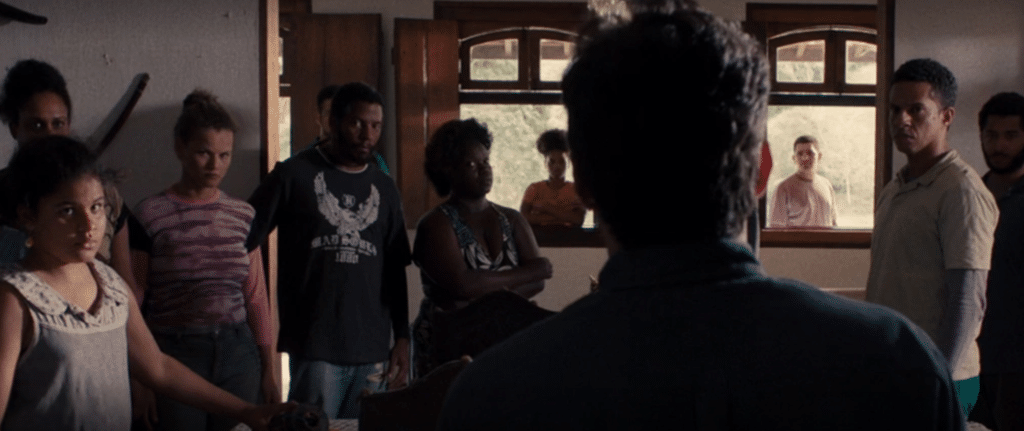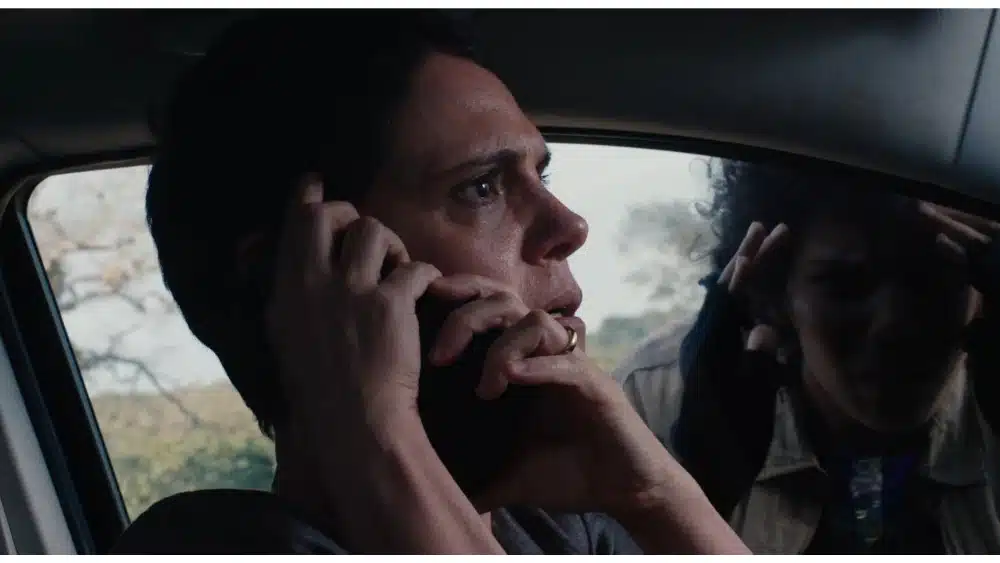
Property (2022) is a film of mighty complexities and great heart, and as such, it outstrips a whole host of films which have tried and failed to sustain a similar balance. If some of its reasoning and momentum dissipate at certain points, then it’s never at the expense of the film’s involving, invoking, grim and meaningful storytelling. It also manages a careful balance throughout, as seen from its opening moments: footage of a man, holding a woman hostage and with a gun to her head, has been demanding “a car”, and fears that the police are holding out on him. He’s correct to worry; the woman, Teresa (Malu Galli) escapes, but the ordeal is not over. So we move from loud to quiet, urban to rural, motion to stillness – a car, a means of travel, is going to unite us with threat and risk again when she is called on to head off somewhere, but at first, the film takes time to show us Teresa’s terrifying nervousness; she can’t bear to even open the door of her idyllic home, doesn’t want to go out, and even when her anxiety blends back into everyday conversation between her and her daughter and husband, we see that all is not well.
Her husband brings us back to what, to him, is a more practical concern: there’s a journey ahead, one they need to take, but he jokingly reassures his wife that she needn’t worry: the car, their new car, has been ‘armoured’. It seems that as a result of her earlier plight, she has become a known face, which can only add to her anxiety – but in any case when she finally gets into the vehicle, she doesn’t seem particularly comforted by the array of mod cons, voice activation and so on. At least, though, there seems to be good reason behind seeking a little more protection: Teresa’s haunted face attests to this. So they’re off, just as the opening credits roll. The journey and the destination (plus the car itself) are the real focus here.
After some time, and a roadside stop which neatly shows us Teresa’s hair-trigger paranoia and unreason, they arrive at a place called Cavalcanti’s Farm. It’s yet another rural idyll: the Robertos seem to have access to a number of them, as money can easily purchase such places – or can it? The farm looks like a regular residence, and given how they treat the place once they get inside, it seems to belong to them too. However, within minutes, it becomes apparent that something is badly wrong here. We quickly shift elsewhere, to moments before, back-filling the narrative: this isn’t just a house, a ‘farm’ in name only, but a real working farm – or, it was.
The resident workers have just received some devastating news: they are about to be displaced, as the land is being sold for development. Dependent upon the farm for an income and a place to live, they are scared and angry, and then lo and behold, here comes the landowner himself. The two timelines are united very cleverly, full of tension, rising questions and – importantly – never at the expense of characterisation. This is no simplistic mob; each person here gets enough delineation, at least initially, to stand apart from one another. When the situation quickly and brutally breaks down, an already tormented Teresa runs from the house and makes it as far as the car – the car which is a mixed blessing, but is at least initially a refuge, which cannot be entered by any of the by turns sad, defiant, pleading or enraged farm workers. But where do we go now?
So much of what unfolds here is multi-layered, deserving of further consideration (and it seems certain the film will get it, given adequate time and exposure). The pernicious, spreading impact of trauma is of vital importance here, starting with clues as to the behaviour of Teresa’s husband – who feels he can just throw money after it and fix it. Money, and its shadow – grave inequality – run through the entire film, with money sometimes giving great preferment and sometimes eroding away to nothing. Films, horror films in particular, have often queried the kind of invincibility which hard cash is culturally believed to confer, pulling it apart in a series of ingenious ways. Property has some overlap with the horror genre, but it’s both simpler and more profound than simply putting someone through the wringer to see what will happen. We are faced with a story of the impoverished rural poor, but not simply a grand reversal of fortune. To quote author Jim Crace in Harvest, another story of the displaced rural poor trying to fight back against circumstance, “dissent is never counted – it is weighed”. Mr Roberto’s rising sense of indignation is worth something here, because he is worth so much: it seems at first as if he is simply going to command his way out of this threatening situation, crowd of aggrieved workers or not. But instead we get a rising and falling battle of wills, more and more centred around Teresa and her unlikely counterpart, farmhand Antonia (Zuleika Ferreira), a woman probably the same age as Teresa, but broken by hard work and grief: each of these women, however, has been alienated by their husbands and their husbands’ decision-making. The result is a horrific situation which neither woman ever wanted.
Based on the film’s blurb, this could easily have been a straightforward invasion horror or a claustrophobic, endurance-style story, but despite having elements of these, it is altogether more expansive and thought-provoking, with context and development. Best of all, the film varies its levels of tension, with moments of poetic parity and gradually dawning moments of realisation throughout; cleverly written and directed by Daniel Bandeira, it is illuminating without – and this is key – lecturing anyone. You invest in these characters and this narrative without ever being cajoled or told what to think, which is a welcome act of trust in the audience. Even with a little more of a growing distance between us and the eventual decision-making which takes place, the film never lets up. Property is an impressively engaging film of extraordinary, lingering power.
Property (2022) will screen at Make Believe Seattle this March (2024). For more details, click here.
